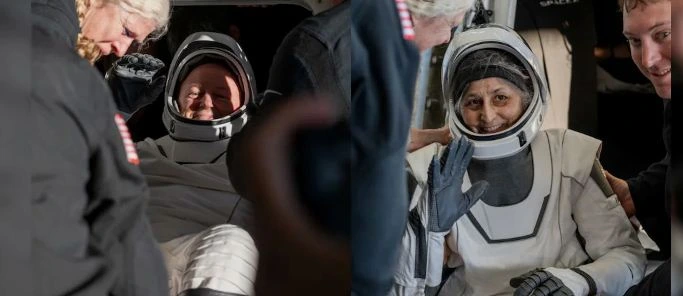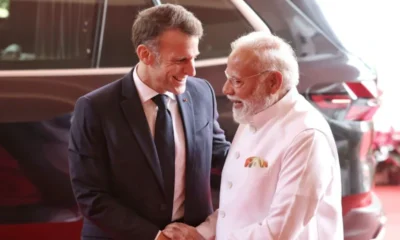NASA astronaut Sunita Williams and her crewmate Butch Wilmore have successfully returned to Earth after spending an unexpected 286 days in space. Originally meant to be an eight-day mission, the duo faced prolonged delays due to technical issues with the Boeing Starliner spacecraft, which left them stranded aboard the International Space Station (ISS).
Williams and Wilmore finally made their journey back aboard SpaceX’s Dragon spacecraft, which splashed down in the ocean near Florida. The mission, which initially launched on June 5 last year, concluded with a safe landing early this morning.
Splashdown near Florida
After spending 17 hours in transit back to Earth, the capsule deployed its parachute, ensuring a controlled descent before making a water landing. NASA teams were on standby to retrieve the astronauts, assisting them onto mobility aids as they adapted to Earth’s gravity.
Williams was seen waving and flashing thumbs-up signs as she emerged from the capsule, signaling a positive return despite the physical challenges posed by prolonged space travel.
SpaceX ensures safe return
The return of the astronauts was made possible through SpaceX’s Crew-9 mission. The Dragon capsule, which was launched atop a Falcon 9 rocket, was sent to replace Crew-9 at the ISS. The spacecraft undocked at 10:35 am (IST), with NASA sharing visuals of the departure.
From an eight-day mission to nine months in space
Williams and Wilmore initially traveled to the ISS on what was to be the first crewed flight of Boeing’s Starliner spacecraft. However, the Starliner developed propulsion issues and was deemed unfit for the return journey. NASA reassigned them to SpaceX’s Crew-9, and in September, a Dragon capsule was sent with a two-member crew to ensure their safe return.
After multiple delays, a relief team finally arrived on Sunday, paving the way for their journey home.
Challenges faced by returning astronauts
A prolonged stay in space presents multiple health challenges. Astronauts experience muscle and bone density loss due to the lack of gravity, which can lead to long-term physical impairments. NASA estimates that for every month in space, astronauts’ weight-bearing bones lose approximately one percent of their density.
Radiation exposure is another concern, as the Earth’s atmosphere provides protection that is unavailable in space. Vision impairment and weakened muscles are also common issues faced by astronauts after extended space travel.
PM Modi acknowledges Sunita Williams’ achievements
Ahead of her return, Indian Prime Minister Narendra Modi sent a letter to Sunita Williams, praising her resilience and contribution to space exploration. The letter, dated March 1 and shared publicly by Union Minister Jitendra Singh, expressed India’s pride in Williams’ achievements.
PM Modi mentioned that he had discussed Williams’ mission with both former US President Donald Trump and his predecessor, Joe Biden, during his visits to the United States. “1.4 billion Indians have always taken great pride in your achievements. Recent developments have yet again showcased your inspirational fortitude and perseverance,” the letter read.
Williams’ return marks the end of an eventful mission filled with challenges and triumphs, further reinforcing her legacy as a seasoned space traveler.























